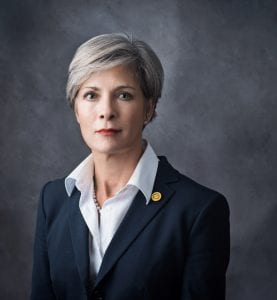Pender County votes to approve 2021-2022 Legislative Goals for NC counties

BURGAW – January 14-15, Commissioner Jackie Newton represented Pender County as a voting delegate for the 2021 North Carolina Association of County Commissioners (NCACC) Legislative Goals Conference on Jan. 14-15.
During the virtual conference, county delegates across North Carolina came together to participate in a series of voting sessions to develop NCACC’s legislative agenda, which will guide county advocacy efforts at the state and federal levels of government. The full list of approved goals is available here.
“Representing Pender County Government and working toward common goals for the betterment of our residents is extremely important to me and my fellow commissioners,” said Jackie Newton, Pender County Commissioner.
On Sept. 21, 2020, the Pender County Board of Commissioners adopted a resolution with their proposed legislative goals which were then submitted to the NCACC for consideration. A copy of Pender County’s Legislative Goals Resolution can be viewed here.
Delegates finalized a slate of dozens of goals including longstanding priorities on expanding broadband access, funding for public school facilities, and efforts to preserve and expand local revenue for counties. Counties also voted to support new goals to address challenges that emerged because of the pandemic, including food insecurity. Counties adopted a new goal to support food supply chain initiatives and funding for North Carolina food banks as well as other equipment, supplies, and other nonrecurring expenses. This goal will further NCACC President Ronnie Smith’s yearlong Resilience Initiative to strengthen North Carolina’s food ecosystem.
Legislative goals pertinent to Pender County include but are not limited to the following goals:
- Agriculture Goal AG-2: Support legislation to protect all farming operations from nuisance lawsuits.
- Environmental Goal, EN-5: Seek legislation to provide additional resources for preventative storm damage maintenance to clear debris to help prevent flood damage in low-lying areas.
- General Government Goal, GG-1: Seek legislation funding and all efforts to expand digital broadband capability to the unserved and underserved residents and GG5: Support legislation to remove inequities and inconsistencies in the current state economic tier program.
- Health and Human Resources Goal, HHS-4 Seek additional funding and preserve block grant allocations to increase access to high quality childcare, early childhood education, child welfare services, adult protective services and guardianship.
- Justice and Public Safety Goal, JPS-4: Support legislation and state funding to provide early intervention services through the Juvenile Crime Prevention Councils, and support increased state funding for the prevention, intervention and treatment of adolescent substance use disorders, gang involvement and domestic violence; and requires the Department of Public Safety to evaluate and update the amount of local matches for JCPC funding.
- Public Education, Goal PE-5: Support legislation to provide exceptions to the K-3 class size mandate including but not limited to lack of school facility space and availability of qualified teachers.
The conference also featured remarks by Governor Roy Cooper, North Carolina Senate President Pro Tempore Phil Berger, and North Carolina Speaker of the House, Tim Moore. Governor Cooper committed to supporting county needs related to vaccine distribution and announced that the state will begin vaccinating individuals 65 and older. He called for robust investments in broadband and other vital infrastructure and emphasized the importance of addressing gaps in healthcare coverage, especially considering the pandemic. Cooper also discussed the state’s progress in implementing disaster recovery programs including the Community Development Block Grant – Disaster Recovery and Hazard Mitigation programs. Senator Berger expressed interest in hearing county priorities, including issues related to authority for local taxes. He also acknowledged the challenges counties are facing because of the pandemic and its economic impact. Speaker Moore pledged to continue to work for robust school capital funding and said the North Carolina House of Representatives is working to distribute more funding to local government and small businesses to address COVID-19 challenges.
The Legislative Goals Conference is the final step in comprehensive, grassroots process, which began in July. Every county is invited to submit proposals, which are approved by their Board of County Commissioners. This year, NCACC received hundreds of goal proposals, which were initially reviewed and vetted by NCACC’s seven Steering Committees. Then, the Legislative Goals Committee reviewed and refined the goals and recommended the package to the NCACC Board of Directors. In December, the Board approved the goals package for consideration by voting delegates at the Legislative Goals Conference.
About the NCACC: The North Carolina Association of County Commissioners (NCACC) is a bipartisan organization, which represents the official voice of all 100 counties on issues considered by the General Assembly, Congress, and federal and state agencies. The Association provides expertise to counties in the areas of advocacy, research, risk management and education and leadership training.
